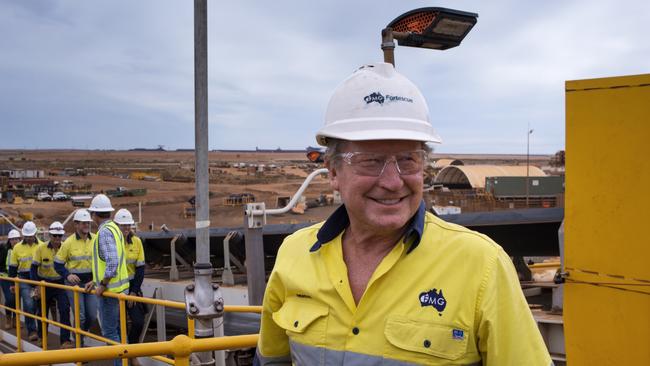Labor banks on business to help its own supporters
Aside from green energy, there is little to provide a major incentive for investment.

Business
Don't miss out on the headlines from Business. Followed categories will be added to My News.
The federal government has ridden the commodity boom to produce a once-in-15-year surplus, but has missed the opportunity for any major structural reforms and tackling the spending blowouts ahead.
While the unexpectedly strong revenues from higher commodity prices and a strong labour market have helped paint a much rosier picture than the October budget, the budget’s lack of major action on spending shows the fiscal position is still vulnerable.
While business will welcome the delivery of the surplus, it will also be critical of allowing unexpected short-term revenue windfalls to overshadow the fact that the budget will find itself back in a structural deficit of more than $35bn in two years.
The budget is unashamedly aimed at helping Labor voters and does nothing to help improve Australia’s lagging productivity which is worrying the Reserve Bank.
“Lucky Jim” is staking his economic credentials on his argument that the government has banked most of its multibillion-dollar revenue windfall with budget spending measures designed to shave 75 basis points off the expected inflation rate in 2023-24.
But his budget delivered in good times masks the need to prepare for the next few years when the world is facing increasing economic uncertainty and the government can no longer rely on the combination of strong commodity prices, and a strong labour market to bail it out at a time when spending on major areas such as the NDIS will challenge the budget.
Business sees that it is the one doing the heavy lifting while Lucky Jim does the spending.
There is little in the budget which provides any bold vision or which would encourage more business investment in areas other than the need to move to a greener economy.
When it comes to economic growth the Treasurer’s only real plan is “embracing clean energy” with $4bn in incentives for the green energy sector.
Fortescue Future Metals founder and executive chair Andrew Forrest will be particularly pleased with the announcement of $2bn for the green hydrogen sector he passionately supports.
It is a long way from the Biden Administration’s $US300bn Inflation Reduction Act but it is a move in the right direction.
But there is little else except for some small, modest measures, which will provide a major incentive for business to invest.
The major “take” is from the oil and gas sector through the tax hike on the petroleum resource rent tax, worth $2.4bn over four years, but there is also a range of stricter tax collection and compliance measures which business will have to accommodate.
The budget documents show an economy which is a lot stronger than many other parts of the world – with unemployment expected to stay below 5 per cent over the next few years and inflation moderating to the Reserve Bank’s target band by 2024-25.
But it shows little evidence of a government prepared to cut spending or give business a boost once the high water mark of May 2023 recedes.
More Coverage
Originally published as Labor banks on business to help its own supporters





